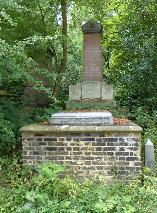Donkin, Bryan |
| ENGINEER (ENGLAND) |
|
BORN 22 Mar 1768, Northumberland - DIED 27 Feb 1855, London: New Kent Road, Southwark GRAVE LOCATION London: Nunhead Cemetery, Linden Grove |
|
Byran Dunkin was the son of a land agent. He grew up in Sandhoe, Northumberland. He worked as a bailiff from 1789 to 1791 for the Duke of Dorset. After that he started an apprenticeship to John Hall in Dartford in 1792 to become an engineer. Hall helped him to set up a business that made mouls for paper works. In 1798 he married Mary Brame, the daughter of a landowner. John Hall had married her elder sister Sarah in 1791. In 1801-1802 he constructed a prototype for a paper-making machine known at the Fourdinier machine. In 1802 he settled in Bermondsey, London. In 1804 he managed to fabricate a working machine. By 1810 eighteen of his machines were installed at mills. In 1812-1813 he set a canning factory in Bermondsey that produced tinned food. Soon the British Admiralty became a customer. He knew Marc Brunel and in the 1820s he was a director of the Thames Tunnel Company. In the 1820s and 1830s he was repeatedly asked by Charles Babbage to help him solve disputes with Joseph Clement, who was contracted to manufacture Babbage's difference engine. In 1838 he was elected into the Royal Society. By 1851 his company had produced nearly 200 machines that were shipped all over the world. In 1846 he withdrew from the business that was continued by his sons. His company constructed a difference engine for the British Government, but when it was completed 1859 costs had overran severely. But it worked and it was used to compute life tables by the General Register Office. He died in 1855 at home in London. Mary died in 1858 and was buried beside him at Nunhead Cemetery. Family • Son: Donkin, Bryan Related persons • has a connection with Babbage, Charles • cooperated with Brunel, Marc Isambard |



